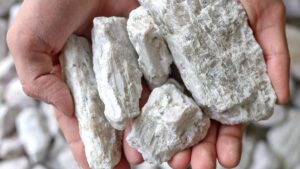Carmakers power dreams of lithium revival as Patriot nabs C$69mn Volkswagen deal

Maybe EVs aren't dead just yet. Pic: Getty Images
- Volkswagen invests C$69 million for 9.9% stake in Ken Brinsden’s Patriot
- VW subsidiary PowerCo plans to take a quarter of the supply from the Shaakichiuwaanaan project
- Miners hope for turnaround amid low lithium prices and nerves over how a shift to the right in the US and elsewhere will impact the EV industry
Ken Brinsden-led Patriot Battery Metals (ASX:PMT), which owns the largest undeveloped hard rock lithium deposit in the western world, has shown enthusiasm from the car industry remains strong despite a wave of negativity during the battery metal’s second “winter”.
The owner of the massive Shaakichiuwaanaan project in Canada’s James Bay region, an area of Quebec hailed as the next Western Australia for its hard rock lithium resource base, has inked a C$69 million deal with Volkswagen’s battery subsidiary PowerCo, which will take a 9.9% stake in PMT at C$4.42 a share.
In exchange it will enter a binding offtake commitment to supply 100,000t of lithium concentrate to PowerCo each year for a decade after opening the mine, around a quarter of its initial production capacity.
A 65% premium to the company’s 30-day VWAP and 35% premium to its 90-day VWAP, the investment is manna from heaven for the C$375 million capped lithium explorer after a 72% fall in its share price.
A massive expansion in chemical manufacturing paired with the rapid development of low grade resources in China and Africa sent lithium prices into freefall after hitting all time highs of over US$80,000/t for chemicals and US$8000/t for concentrate feedstocks in late 2022.
That was coupled with slowing EV demand growth. While Chinese electric vehicle sales continue to increase, albeit at a slower rate than in 2022 and 2023, Europe’s EV market share fell from 20% in H1 2023 to 18% in H1 2024 and the US was stagnant at 9% of new car sales.
But former Pilbara Minerals (ASX:PLS) boss Ken Brinsden said European and American automakers are still planning for a future where EV sales grow more dominant despite short-term jitters.
“If you’re a western OEM you don’t have much choice now, I think, but to continue to invest in the EV supply chain,” he said.
“China represents this incredible existential threat right now as to how good their product is and how price competitive it is.
“It’s not good enough to just stick your hear in the sand and pretend that EVs are going to go away.
“They’re not because the rest of the world, but especially China and arguably the Koreans are really focused on getting the right product in the market. It’s ultra-competitive and you’re going to have to compete.”
Trump rhetoric
The major investment comes at a tense time for participants in the North American EV supply chain.
Donald Trump is about to return to the White House, having previously pledged to unwind at least in part the major US infrastructure policy used by outgoing President Joe Biden to support the US lithium battery and EV supply chain, the Inflation Reduction Act.
Already Reuters has reported on transition documents which reportedly include plans to roll back EV subsidies, charging infrastructure, battery imports – largely sourced from China – and prevent the US military from buying EVs.
That is despite the key role Tesla CEO Elon Musk played in the Republican’s election campaign and his appointment to a non-cabinet advisory role to review “government efficiency”. In case you didn’t know, Musk sells EVs for a job.
All that aside, Brinsden thinks the need to compete with China will eventually dictate investment in critical minerals, including lithium, in the US.
“Despite Trump’s rhetoric, what he says compared to what he does, I think they’re probably two different things,” Brinsden said.
Brinsden thinks rising geopolitical tensions could still incentivise more investment in North America.
“It’ll become obvious just how weak they are in their supply chains, China’s dominance is virtually all complete and in certain minerals, lithium being one of them, they almost have an absent supply chain,” he added.
“So there obviously needs to be more investment in raw materials and then there needs to be more investment in value-added chemicals.”
VW’s PowerCo is planning to open a new gigafactory – a plant that manufactures lithium ion batteries – at Saint Thomas in Canada in 2027, targeting total capacity of 200GWh a year along with plants in Valencia and Salzgitter in Spain and Germany.
Market on the turn?
The placement comes at an opportune time for Patriot.
Regularly regarded as a potential takeover target, especially given Brinsden’s links to the cashed up $7 billion ASX giant Pilbara, counter-cyclical M&A has heated up this year as big market players have started to place bets on a market turnaround.
Gina Rinehart’s Hancock Prospecting and Chile’s SQM drank merrily from the froth that bubbled up in the 2021-2023 boom with their $1.7 billion deal to acquire pre-resource Azure Minerals, but Pilbara’s $560m scrip merger for a depressed Latin Resources (ASX:LRS) and Rio Tinto’s (ASX:RIO) $10bn cash offer for Arcadium Lithium (ASX:LTM) are signs of confidence that market player think the downturn could be short-lived as demand for lithium increases.
Rio sees it rising fivefold by 2035.
Brinsden, who steered PLS from near bankruptcy in the last lithium winter of 2018-2020 to become an ASX 50 miner and a household investing name, said he saw parallels between the current market and the one which slingshotted out of the last depression.
“China kept investing and that’s exactly what’s happening in this current cycle,” he said, while cautioning he “doesn’t have a crystal ball”.
“They’re still building cellmaking capacity, and they’re still building chemical capacity. What they’re going to do is turn that on and that’s basically where the next demand shock comes from.
“To me that seems a highly likely outcome and we’ve seen this movie before.
“It’s probably going to surprise western analysts when (the rebound) happens sooner than they’re currently assuming.”
Australian miners have been trimming production this year without making major cuts, with Mineral Resources (ASX:MIN) shutting its Bald Hill mine and halting expansions at Wodgina, Core Lithium (ASX:CXO) closing the Finniss operation, Pilbara shutting down the secondary Ngungaju plant at the Pilgangoora mine and Arcadium announcing it would shut the Mt Cattlin operation early in 2025.
A major lepidolite mine owned by battery giant CATL in China was also placed on ice.
Whether that takes enough material out of a market where incumbents are still investing in expansion remains to be seen, with the Mt Holland and Liontown Resources (ASX:LTR) Kathleen Valley mines both opening in 2024, albeit with the latter at a reduced scale.
PMT last closed at C$2.65 in Canada and was up 5% to 32c on the ASX Wednesday, with the VW deal likely to bring significant support to its share price at a time when it could be vulnerable to predators.
VW has agreed to a 24-month standstill, common in this kind of agreement, which will prevent it from taking a blocking position if a bid does come in.
But it has also committed to potentially make further finance available on the completion of a feasibility study at Shaakichiuwaanaan, due in the September quarter next year.
Shaaki-
A preliminary economic assessment on Shaakichiuwaanaan this year – effectively a scoping study – placed a US$487 million ($770m) price tag on a 400,000tpa first stage development with first concentrate due in 2029.
A further US$310m investment ($491m) leveraging the underground development of the high grade Nova zone, which is unique outside the world-leading Greenbushes mine in WA’s South West in running over 2% Li2O, would see the project expand eventually to 800,000tpa.
That was set at aspirational prices of US$1500/t on an SC6 basis. Price agency Fastmarkets reported them at US$850/t on Tuesday.
With the supply contract is subject to a final investment decision, approvals, and PMT having the project’s first stage commissioned by at the latest June 30, 2031.
Brinsden said the Volkswagen deal was evidence western OEMs would invest in developing the supply chain outside China.
It includes an MoU to establish an ongoing relationship between the miner and carmaker, which could lead to the development of a chemical conversion facility, a key part of the market largely cornered currently by China.
Related Topics

UNLOCK INSIGHTS
Discover the untold stories of emerging ASX stocks.
Daily news and expert analysis, it's free to subscribe.
By proceeding, you confirm you understand that we handle personal information in accordance with our Privacy Policy.








